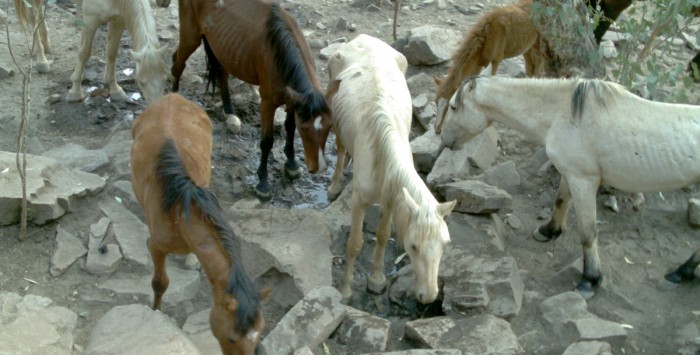
Traditional owners of four Aboriginal land trusts west of Alice Springs today gave consent to cull feral horses while a community meeting at Ltyentye Apurte (Santa Teresa) agreed how to safely dispose of horse carcasses.
At a meeting at Ntaria (Hermannsburg) traditional owners instructed the Central Land Council to organise an aerial cull to alleviate the suffering of other feral horses near the remote community.
The cull is scheduled to take place next week on the Ntaria [pronounced DA-rie], Rodna [pronounced ROD-nuh], Roulpmaulpma [pronounced ROULP-malp-muh] and Ltalaltuma [pronounced LA-la-too-muh] Aboriginal land trusts.
It will take place in a 3,182 square kilometre area and is expected to cost at least $19,000, with CLC staff providing ground support to the Parks and Wildlife Service.
Traditional owners were concerned about the feral horses’ poor condition and their impact on native animals, country and infrastructure.
They decided that the cull go ahead as soon as possible to minimise further suffering.
Meanwhile, a community meeting at Ltyentye Apurte this morning decided to move the bodies of horses that previously perished near a waterhole approximately 20 kilometres from the community to an area where they will not present a biohazard.
Last Friday, the CLC culled more than 50 feral horses after its Aboriginal ranger team found 90 dead and dying brumbies at the Apwerte Uyerreme [pronounced POUR-da YOU-rum] waterhole a day earlier.
The meeting participants, including residents, a local Aboriginal corporation and the MacDonnell Regional Council, agreed with traditional owners of the Santa Teresa Aboriginal Land Trust who want to “let the sun do its work” rather than to bury or burn the bodies.
They agreed to work together on a long-term management plan to attempt to avoid mass feral animal deaths in the future.
Last year the CLC sought additional resources to help traditional owners in the Ltyentye Apurte, Ntaria, Tennant Creek and Ti Tree regions to develop ‘Healthy Country’ management plans.
It expects the NT government to honour its commitment to contribute $200,000 towards these plans, which would be developed with the relevant traditional owners.
The plans would help Aboriginal rangers to manage feral animal numbers and enable traditional owners to muster and sell healthy animals.
More emergency culls are likely on Aboriginal land, following weeks of temperatures above 40 degrees Celsius.
Horses and other feral animals are dying of thirst and hunger because water sources are depleted and overpopulation has led to erosion and vegetation loss.
